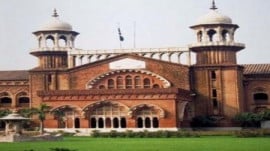
Five years ago, five young Pakistanis studying in the UK decided to do something for their homeland. Deeply troubled by the lynching of two brothers in Sialkot in 2010, Ahad Aziz, Hira Omar, Iqra Musaddaq, Ghazi Taimoor and Amar Abbasi put their heads together to figure out what the country's youth needed most. The answer, they believed, was the ability to think critically. And thus, the foundation for 'Ilmqilab' (revolution through learning) was laid.
Joining hands with a local organisation, the five friends began giving lectures to students in grades six to 10 at a Landhi government school. They used video conferencing to make it possible for those living abroad to contribute what they wanted for the students despite the barriers of distance and time.
"We started off with mostly social and moral issues," Abbasi, a barrister-at-law, told The Express Tribune. "We would present a 15 minute lecture and a five minute case study on topics such as harassment or the role of the police, and then the students would prepare responses. The best response would earn a Rs500 prize."
Monday (today), on March 23, Ilmqilab is being launched formally. With an initial target of 500 students in Lahore and Karachi, the campaign will focus on discussing issues such as dowry, gender equality, tolerance, sectarianism, privacy, environmental hazards and going green. The lectures will be presented to students twice or thrice a week in cooperation with their schools and teachers.
"We need lecturers, academics and anyone passionate and committed to promoting education and critical thinking," said Abbasi, adding that the group was looking for 'ilmqilabis'. "We are also seeking people who can work on the transcripts, content-building and research - those who are camera-shy can still play a part."
Elaborating on whether they plan to try to integrate this approach in the school curriculum too, Abbasi said that they first wanted to test the waters with recorded lectures. "The school curriculum needs real-time interaction between students and teachers," he explained. "Perhaps in the future, when we expand to live lectures, we might work towards that too."
Published in The Express Tribune, March 23rd, 2015.



































COMMENTS
Comments are moderated and generally will be posted if they are on-topic and not abusive.
For more information, please see our Comments FAQ